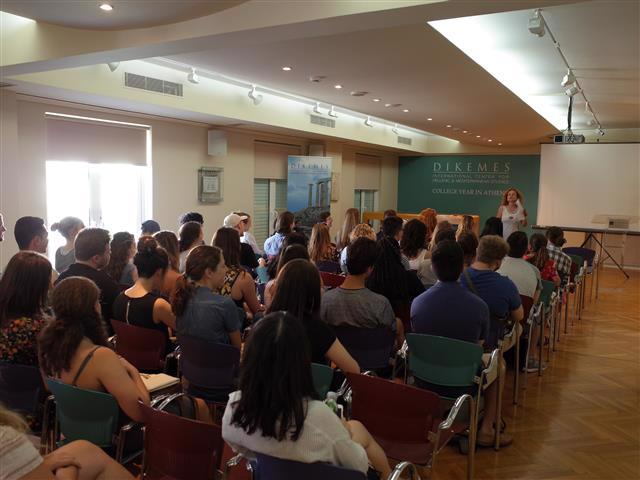Active excavation, travel writing, philosophy, history, food, good times… CYA summer sessions begin!
|
|
|
|

Summer classes have started at CYA and students are already enjoying a unique combination of academic experiences and day-to-day cultural explorations.
Summer session I lasts from May 28 to June 23 and it includes four courses that put an emphasis on learning beyond the classroom. Field trips and site visits have a central role in helping students gain a deeper understanding of their academic subject and at the same time experience the vibrant Greek summer culture.
 Orientation week at CYA Orientation week at CYA
|
|
|
 Sunset excavation works at Despotiko Sunset excavation works at Despotiko |
|
|
Despotiko is an uninhabited island, situated almost exactly in the center of the Cyclades in the Aegean Sea. A small island with enormous archaeological interest, as it is believed to be home to a sanctuary of Apollo. This is where the CYA students will work for the next few weeks, actively participating in the excavation of one of the most prominent sanctuaries of the Aegean.
In 2017, course participants detected an edifice lying outside the sacred precinct. This year’s excavation focuses on exploring this building, identifying its character and reconstructing the activities it housed. Archaeology professor, Alexandra Alexandridou, emphasizes the immense importance of this project and all participants are very excited to play a major role in its development.
During the first days on the island, the students enthusiastically familiarized themselves with the excavation procedure and the documentation process of the daily activities at the site. To fully understand the importance of recording the findings, they take turns in becoming trench-masters for a number of days, and responsible for keeping the excavation diary.
|
|
|
 Professor Afzal and his class at Eleusis Professor Afzal and his class at Eleusis |
|
|
The first two weeks of the course are dedicated to gaining an understanding of the religious, social and political life of the Greek city in antiquity. As participants’ understanding of the Greek city will deepen, they will move on to study the work and thinking of St. Paul and the impact the emergence of Christianity had on the Greco-Roman world.
Students followed lectures and discussions at the CYA campus, at the heart of Athens. The class also visited major centers of Greek religious life in the first century of the Common Era.
Students were particularly impressed by their trip to Ancient Eleusis and the sanctuary of Demeter, one of the most important religious places of antiquity! Professor Cameron Afzal, who is a visiting professor this summer from Sarah Lawrence College, discussed with the class the Eleusinian Mysteries and the secret religious rites of Ancient Greece. Next, students found themselves at the very same spot from where Persian King Xerxes watched the Battle of Salamis, in 480BC.
A truly fascinating experience that is just a preview of the field trips and adventures to follow as the course continues to other important Greek cities: Philippi, Thessalonica and Corinth.
|
|
|
Becoming a Traveler: Writing in Greece |
|
 Travel writers explore Athens Travel writers explore Athens |
|
|
This original course explores various questions that arise when writing travel literature for the page or the screen: How does one write about a foreign country or people with a sense of respect for diversity? In what ways do our expectations and our actual perceptions of a place juxtapose, merge or align? How can one build a narrative that offers an argument? And, how do we translate this argument for different media – from the essay to the short documentary?
Greece plays of course a very important role in this travel literature course. The country’s rich myth, history and literary tradition act as a lens for students to unfold their own writing and critical thinking skills.
As most traveler writers do, participants keep a daily journal recording their experiences. Over the first two weeks, these journals document their tour to the main sites and hidden spots of Athens, as well as their trip to the Ancient theatre of Epidaurus.
Next, Dr. Christine Harrison and the students will be staying at the island of Poros, strolling around the picturesque narrow streets, visiting the Clock Tower, the Temple of Poseidon and the Archaeological Museum, as well as the beautiful beaches of the island.
|
|
|
The
2nd Athens Philosophy Seminar (APS) by CYA focuses on the topic of “Philosophy & Film” and we are very proud to welcome Professor Robert B. Pippin as our distinguished guest. He will give a series of five lectures with the title “Film as a Moving Image of Skepticism”. Professor Pippin, from the University of Chicago, has contributed to the study of Kant, Hegel, modernism, political philosophy, self-consciousness, freedom, but also literature and philosophy and film and philosophy.
According to philosophy professor, Evgenia Mylonaki, the Seminar is intended for outstanding undergraduate students who are entertaining the prospect of a graduate career in philosophy.
During the first part of the APS, students acquaint themselves with philosophical issues based on works by Hegel, Rousseau, Wittgenstein, C. Taylor, S. Cavell, R. Pippin, R. Moran, V. Perkins, R. Wood, etc.
In the second part of the seminar Robert Pippin himself will lecture on four masterpieces of the American Cinema:
- Alfred Hitchcock’s Vertigo, 1958
- John Ford’s The Searchers, 1956
- Nicholas Ray’s In a Lonely Place, 1950
- Roman Polanski’s Chinatown 1974
|
|
|
| |
|
|

